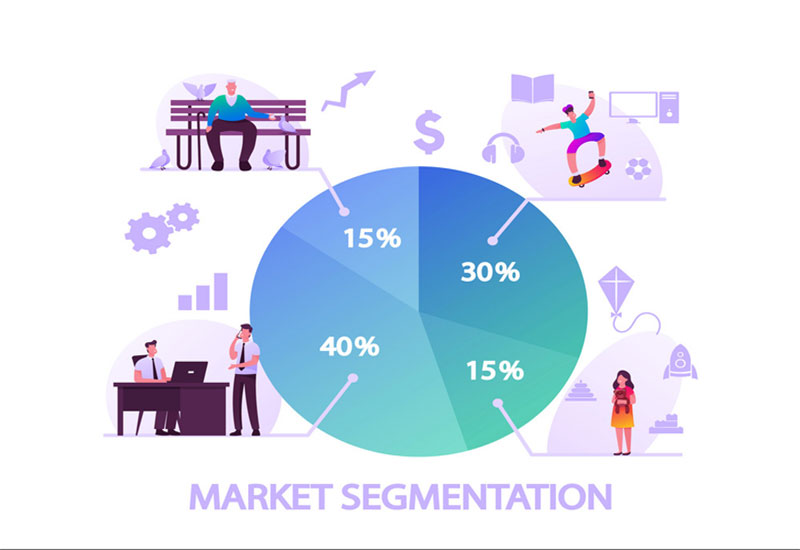Understanding Market Segmentation with Mind Maps
When attempting to reach the potential clients and audience with a message or promotion, or campaign, focusing on the correct market with the right message is fundamental. If you point too extensively, your notice may contact a couple of individuals who wind up turning into customers or clients. However, you will hit the audience that is not interested in your campaign, service, or message. Therefore, it is important to analyze your target market and streamline the right audience, so you do not waste your dollars on advertising or promotion over something that is not useful. This article includes an understanding of the market segmentation, its importance, benefits, and types.
Introduction
Market segmentation helps focus on an audience that is certain to become satisfied consumers of your organization or potential customers of your service or product. To segment a market, you need to divide it into groups that have equivalent or mutual qualities. You can gather a section with respect to the characteristic. Sorting out a group of people in this way considers a more specifically focused market while promoting and marketing, especially if it is customized content.

Marketing segmentation is significant for marketers as it helps them personalize the campaign and target the audience that is suitable. It can help save time, energy, and money, as well as a number of other factors.
What is Market Segmentation?
The marketing segment is a term that is used to divide the individuals, potential clients, or target audience into different groups that share mutual needs and would respond similarly to the marketing action.
It is a practice by marketers to reach out to the right audience. It helps in creating subsets of the market that are based on the needs, requirements, common interest, priorities, demographics, and other multiple ways in order to understand well about the market to be targeted. By understanding your market segments, you can use this to focus on your sales, marketing strategies, and product. Market segments can enhance the development of your product cycles by illuminating how you make the offers of the product for various segments like gender, income, age, etc.

Importance of Market Segmentation
Market segmentation can assist you with defining and better comprehending your target audience or the interested group of ideal clients. In case you are a marketer, the market segmentation lets you distinguish and segment the correct market for your service, campaign, or product and later focus on marketing more adequately. Likewise, publishers can utilize market segmentation to provide customized and well-organized content for different audiences and to target the options of advertising more specifically.
Market segmentation helps the marketers to easily personalize the campaigns for marketing so they can target the right audience.
By arranging the organization's market into segments, instead of focusing on every potential client independently, the marketers can be more proficient with their money, energy, time, and other resources than if they were focusing on consumers on an individual level. Gathering like-minded consumers or grouping the consumers sharing similar interests permits the marketers to target the audience specifically in a way that is more effective.

Example
You are a marketer who is supposed to look after the promotion of a newly launched brand of cat food. You could part a group of people into segments dependent on whether they have a cat or not. You could then segment the audience further dependent on what sort of cat they have and afterward show them the promotions for food figured for their breed of cat. A publisher could utilize this equivalent data to show content about cats to individuals who have or like cats.
Market segmentation lets you focus on your content to the right person and market in the exact way, as opposed to focusing on an entire audience with generic message. This assists you in increasing the odds of people creating engagement with your promotion or campaign, bringing about more effective objectives and better return of investment (ROI).
Types of Market Segmentation
- Demographic Market Segmentation
The demographic market segmentation is one of the well-known and commonly used types. The demographic segmentation alludes to the statistical data like age, income, gender, location, education, ethnicity, etc.
- Psychographic Market Segmentation
Psychographic marketing segmentation is about the categorization where the individuals are grouped according to their characteristics and personalities, including values, lifestyle, attitude, personality traits, interests, priorities, etc.
- Behavioral Marketing Segmentation
The behavioral marketing segmentation and psychographic segmentation has minor difference behavioral segmentation refers to the actions of the customers like user status, spending habits, purchasing habits, brand interactions, etc.
- Geographic Marketing Segmentation
Geographic marketing segmentation is one of the very easy and simple to understand the type of marketing segmentation as it categorizes the targeted audience in the geographic borders such as the ZIP code, climate, country, city, etc.

Conclusion
Market segmentation is the procedure of segregating the market into groups of mutual individuals to make sure that you target the right audience for your promotion, service, or product. It is essential for marketers as it helps save their time and money and improves productivity and ROI.


